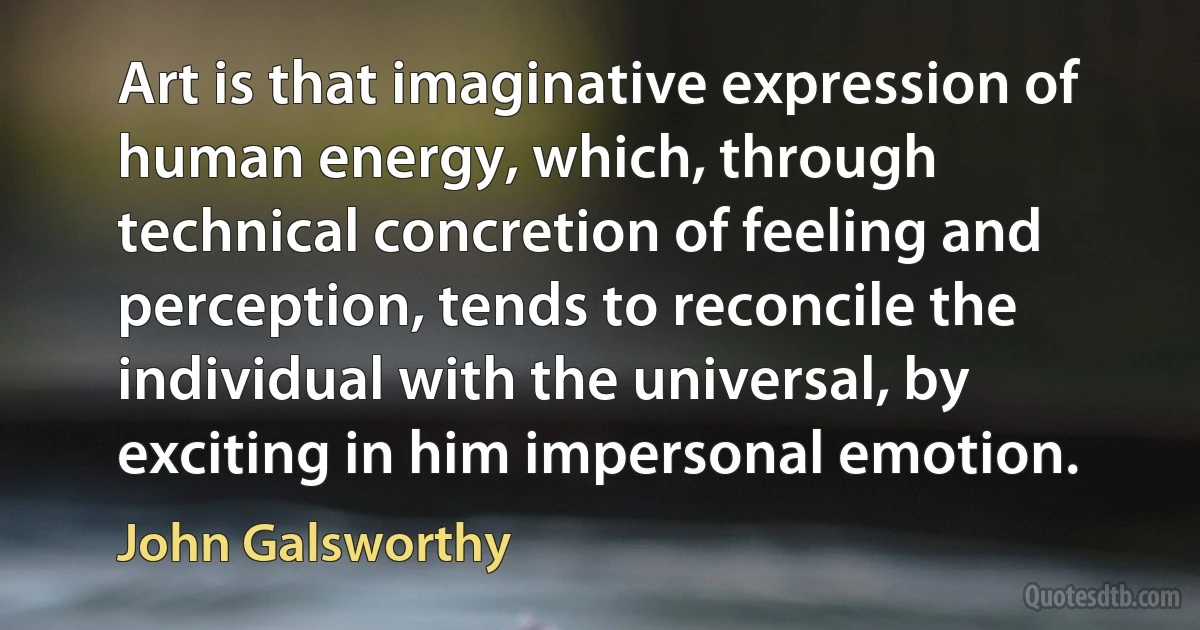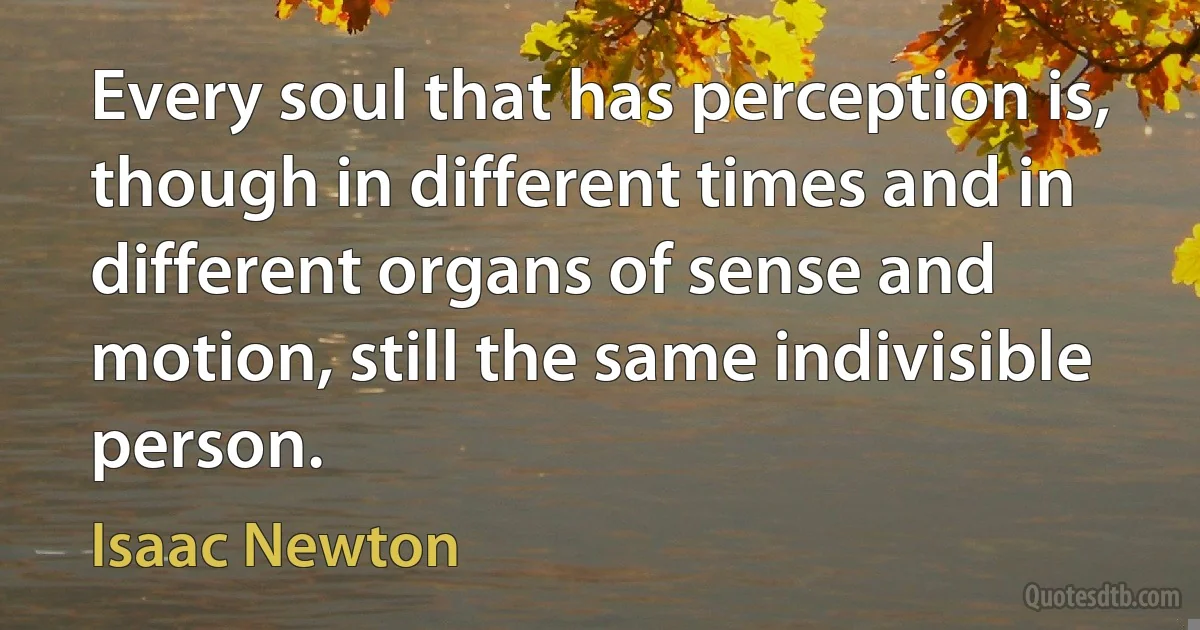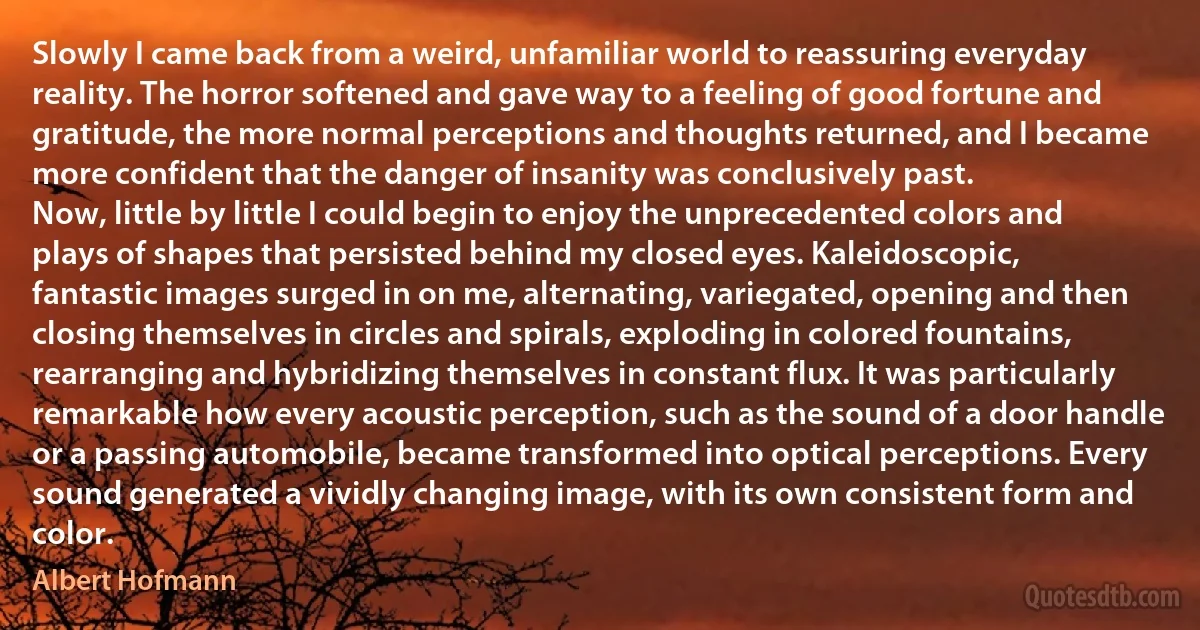Perception Quotes - page 30
In real life, however, you don't react to what someone did; you react only to what you think she did, and the gap between action and perception is bridged by the art of impression management. If life itself is but what you deem it, then why not focus your efforts on persuading others to believe that you are a virtuous and trustworthy cooperator?

Jonathan Haidt
Computer games are embedded in the cultural framework of technological developments. In the study of technological development and creativity, focusing attention on the failure, the error, the breakdown, the malfunction means opening the black box of technology. Studies have convincingly demonstrated that the widespread inability to understand technological artifacts as fabricated entities, as social and cultural phenomena, derives from the fact that in retrospect only those technologies that prove functional for a culture and can be integrated into everyday life are "left over." However, the perception of what is functional, successful and useful is itself the product of social and cultural--and last but not least--political and economic processes. Selection processes and abandoned products and product forms are usually not discussed. According to Langdon Winner, there is a sense in which all technical activity contains an inherent tendency toward forgetfulness.

Johannes Grenzfurthner
If each us had a different kind of sense perception - if we could only perceive things now as a bird, now as a worm, now as a plant, or if one of us saw a stimulus as red, another as blue, while a third even heard the same stimulus as a sound - then no one would speak of such a regularity of nature, rather, nature would be grasped only as a creation which is subjective in the highest degree. After all, what is a law of nature as such for us? We are not acquainted with it in itself, but only with its effects, which means in its relation to other laws of nature - which, in turn, are known to us only as sums of relations. Therefore all these relations always refer again to others and are thoroughly incomprehensible to us in their essence.

Friedrich Nietzsche
Illusionistic art appeals to what the public knows not about art but about things. This ability to brush art aside is the secret of the popularity of illusionism. Ever since the Greeks told of painted grapes being pecked by real birds, wonder at skill in deceiving the eye has moved more people than appreciation of aesthetic quality. But for art to depend exclusively upon reproducing appearances has the disadvantage of requiring that the painting or sculpture conform to the common perception of things.

Harold Rosenberg
It is true that our everyday view of the world is not quite naively realistic, but that is what it would like to be. Common-sense is naively realistic wherever it does not think that there is some positive reason why it should cease to be so. And this is so in the vast majority of its perceptions. When we see a tree we think that it is really green and really waving about in precisely the same way as it appears to be. We do not think of our object of perception being 'like' the real tree, we think that what we perceive is the tree, and that it is just the same at a given moment whether it be perceived or not, except that what we perceive may be only a part of the real tree.

C. D. Broad
If one hundred people perceive the same event, you hear one hundred different stories, and everybody claims that his or her story is the true story. Of course, it's only true for that person, and your story is only true for you.
What we share with one another is just our perception; it is just our point of view. And it's completely normal because the only thing we have is our point of view.
You know, the way we create our stories is very interesting. We have a tendency to distort everything we perceive to make it agree with what we already believe; we "fix it" to make it agree with our lies. It is amazing how we do this.
With awareness, we recover the control of our story. That is the good news. If we don't like our story, we are the authors; we can change it.

Miguel Ángel Ruiz
Rex is our quarterback... He's not as accurate as he needs to be and he turned the ball over, but we've won with him. There's a difference between perception and reality, and the reality is, we're 10-2 with Rex. When we win the division title, I'm not going to tell you about all the things we're going to do to change what we have going right now. Because there's not a lot.

Rex Grossman
In each art the difficulty of the form is a substitution for the difficulty of direct apprehension and expression of the object. The first difficulty may be more or less overcome, but the second is insuperable; thus every poem begins, or ought to, by a disorderly retreat to defensible positions. Or, rather, by a perception of the hopelessness of direct combat, and a resort to the warfare of spells, effigies, and prophecies. The relation between the artist and reality is an oblique one, and indeed there is no good art which is not consciously oblique. If you respect the reality of the world, you know that you can approach that reality only by indirect means.

Richard Wilbur
The general laws of Nature are not, for the most part, immediate objects of perception. They are either inductive inferences from a large body of facts, the common truth in which they express, or, in their origin at least, physical hypotheses of a causal nature serving to explain phenomena with undeviating precision, and to enable us to predict new combinations of them. They are in all cases, and in the strictest sense of the term, probable conclusions, approaching, indeed, ever and ever nearer to certainty, as they receive more and more of the confirmation of experience. But of the character of probability, in the strict and proper sense of that term, they are never wholly divested. On the other hand, the knowledge of the laws of the mind does not require as its basis any extensive collection of observations. The general truth is seen in the particular instance, and it is not confirmed by the repetition of instances.

George Boole



